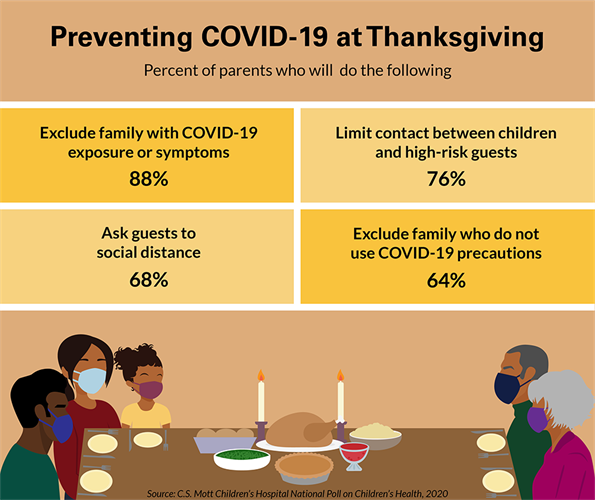November 23, 2020 -- Parents are weighing the risks and benefits of gathering with extended family this year, amidst the global COVID-19 pandemic. Most parents are planning to prioritize continuing Thanksgiving traditions while reducing transmission risks, according to a new national Mott Poll.
Spending time with extended family (grandparents, cousins, or other relatives) can help children connect with their own history and understand their place in the world. Holidays are an important time when families carry on traditions that are passed down through generations.
"As COVID-19 cases spike, many families are struggling with whether and how to continue their holiday traditions while balancing risks and benefits," said Sarah Clark, MPH, Mott Poll co-director, in a statement.
A national representative survey based on responses from 1,443 parents of at least one child age 12 or under in the U.S. was conducted by researchers from the C.S. Mott Children's Hospital National Poll on Children's Health at Michigan Medicine.
Thanksgiving traditions during a global pandemic
In the Mott Poll survey, nearly all parents (94%) reported that their children get together with extended family members for different occasions. And specifically, 76% of parents said that their children get to see extended family on Thanksgiving. Most Thanksgiving gatherings include grandparents or other older adults (88%) and individuals traveling out of state (40%).
COVID-19 has been a major restriction in 2020, especially when it comes to children spending time with extended family. Among parents whose children normally see extended family on Thanksgiving, only 61% plan on an in-person gathering with extended family this year. And only 18% plan to involve persons traveling from out of state.
In thinking about Thanksgiving plans in 2020, parents seem to be balancing the risks of spreading COVID-19 with the benefits of having a traditional celebration. During the pandemic, three-quarters of parents (78%) feel that it is important to prevent the spread of COVID-19. Yet, over half of parents (53%) indicated that it is very important for their children to be with extended family and share in Thanksgiving traditions.

Importantly, the researchers found that only one-third of parents (35%) feel that overall, the benefits of gathering with extended family at Thanksgiving are worth the risk of spreading or getting COVID-19.
Strategies to mitigate the risk of COVID-19 during holiday gatherings
The risk of COVID-19 transmission can be minimized by carefully choosing whom to include in Thanksgiving celebrations. Nearly all parents plan to exclude family members who have been exposed to or reported symptoms of COVID-19 (88%). Many also plan to exclude family members who have not been following recommended public health measures such as wearing masks, social distancing, and avoiding social gatherings (64%).
Most parents (76%) reported that they will limit contact between children and grandparents and other high-risk adults. Two-thirds of parents (68%) plan on asking guests to maintain social distancing as much as possible. However, this may be difficult for many families to navigate throughout multiday visits in extended periods spent together in communal areas.
"Parents should be realistic about how feasible it will be to limit contact and think carefully about whether to gather in person with high-risk family members," Clark explained.
Mott Poll researchers said that family traditions can be preserved without an in-person gathering by incorporating various aspects of Thanksgiving traditions (e.g. food, decorations, and activities) into a virtual celebration. In families that choose to celebrate with extended family in-person, the researchers recommend that parents should talk with children in advance about how to celebrate safely, including a reminder about masks and social distancing, and engaging in as many outdoor activities as possible.
"We all know that large public gatherings carry great risks of spreading COVID-19. But small and casual social gatherings where people feel most 'safe' are also part of what has been fueling transmission," Clark said. "With COVID-19 cases increasing in every state, it is essential that all family members do their part to prevent further spread. That may mean celebrating the holidays a little differently this year."
Do you have a unique perspective on your research related to infectious disease or public health research? Contact the editor today to learn more.
Copyright © 2020 scienceboard.net


